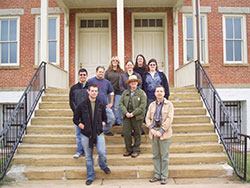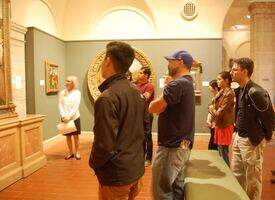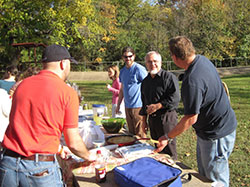History Department: Immersive Learning
 Students are more apt to commit significant time and effort to their studies if they
clearly see the purpose of their assignments and can relate them to activities of
consequence in the world outside the classroom. The Department of History is committed
to engaging students in creative and meaningful tasks that promote the development
of investigative skills, stimulate critical thinking, and enhance the ability to communicate
in the written and spoken word. While a broad understanding of the significant development
of the past is vital to the achievement of these goals, reading assignments and lectures
should be leavened with opportunities for students to apply information learned there
in creative interchanges with other members of the class, the instructor, and individuals
beyond the classroom. From the time students arrive as incoming freshmen until they
complete their programs as seniors or graduate students, they should be immersed in
a learning environment that is both creative and demanding one that stimulates inquiry
and rewards practical application of knowledge and skills learned in and beyond the
university.
Students are more apt to commit significant time and effort to their studies if they
clearly see the purpose of their assignments and can relate them to activities of
consequence in the world outside the classroom. The Department of History is committed
to engaging students in creative and meaningful tasks that promote the development
of investigative skills, stimulate critical thinking, and enhance the ability to communicate
in the written and spoken word. While a broad understanding of the significant development
of the past is vital to the achievement of these goals, reading assignments and lectures
should be leavened with opportunities for students to apply information learned there
in creative interchanges with other members of the class, the instructor, and individuals
beyond the classroom. From the time students arrive as incoming freshmen until they
complete their programs as seniors or graduate students, they should be immersed in
a learning environment that is both creative and demanding one that stimulates inquiry
and rewards practical application of knowledge and skills learned in and beyond the
university.
 The history department seeks to immerse the student in the learning process by many
different approaches, some of which are listed below:
The history department seeks to immerse the student in the learning process by many
different approaches, some of which are listed below:
- Participation in departmentally-sponsored clubs and honor societies which offer speakers and programs that supplement classroom learning
- Organizing field trips to nearby sites of historical significance
- Inviting guest speakers with historical expertise in specific areas to share their knowledge with students in classes
- Cooperation with nearby historical sites, museums, and archives to provide opportunities for students to intern in positions that provide real-world experience and allow them to apply information and skills learned in the department's programs
- Encouragement of students to participate in intramural and interscholastic academic competitions
- Encouraging and assisting students in producing historical papers for publication in the local press, state, regional, and national historical journals, and scholarly presses.
- Inviting students to participate in faculty research projects
 Encouraging students to volunteer at nearby historical sites and museums
Encouraging students to volunteer at nearby historical sites and museums- Development of assignments that require students to apply the knowledge and skills learned in the classroom in activities like those undertaken by professional historians
- Encourage students to take an active role in local historical organizations
- Encourage students to serve as judges or assistants in the administration of the annual History Day Contest
